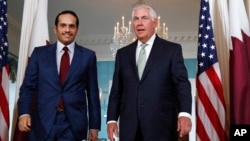Qatar’s foreign minister says Doha is interested in negotiating an end to the standoff with regional forces, as long as it doesn’t interfere with the country’s sovereignty.
Sheikh Mohammed bin Abdulrahman Al Thani spoke at the Arab Center in Washington this week, two days after meeting with Secretary of State Rex Tillerson regarding the tiny Gulf nation’s growing dispute with Saudi Arabia, the United Arab Emirates, Bahrain, Egypt and several other nations.
Watch: Qatar Willing to Negotiate, Will Not Give Up Sovereignty
On June 5, the Saudi-led group suspended all relations and accused Qatar of supporting extremist groups and destabilizing the region. Qatar has denied all such claims.
Al Thani said Qatar is willing to sit down for negotiations with the other regional forces, “so long as there is no interference in its sovereignty.”
“Qatar and the U.S. agreed that the best way is to pursue a negotiating path, not ultimatums,” he added.
A busy round of diplomatic meetings
The U.S. has played a vital role for Qatar, Al Thani said, adding that he hopes Washington will exert pressure on the Arab states blockading Qatar, and get them to negotiate, not dictate, to their smaller neighbor.
It’s been a busy week in Washington, as Tillerson also has met with top officials from Kuwait and Saudi Arabia to urge on negotiations to end the crisis.
In the background of those talks at the State Department, another voice was heard from Capitol Hill earlier in the week. Senator Bob Corker, chairman of the Senate Foreign Relations Committee, said he would be willing to block U.S. arms sales to Saudi Arabia, Qatar and their neighbors in the Gulf Cooperation Council, if that would push them toward ending their standoff, since all are important American allies in the region.
“Before we provide any further clearances during the informal review period on sales of lethal military equipment to the GCC states, we need a better understanding of the path to resolve the current dispute,” Corker said in a letter to Tillerson.
The threat to block weapons deals may help Tillerson’s efforts to persuade the feuding parties to move toward an agreement.
Tillerson: Get issues on the table
“Our role has been to encourage the parties to get their issues on the table, clearly articulated,” Tillerson said, “so that those issues can be addressed and some resolution process can get under way to bring this to a conclusion.”
The Saudi-led coalition, however, has shown no willingness to ease the 13-point list of demands that the group sent to Qatar. Among other things, the Saudis and their partners insist Qatar must downgrade its relations with Iran and close the Qatari-state-funded Al Jazeera news network.
Steve Grand, executive director of Middle East Strategy Task Force at the Atlantic Council, said such demands appear to be unrealistic.
“The kind of demands that have been made of Qatar, and the way in which those demands were made, would not produce the kind of results that is desired,” Grand said. “I don’t think the Qataris are just going to accede to the many demands that have been placed upon them,” he added.
He argued that the current disunity within the Gulf Cooperation Council, which had until recently been a model of positive regional cooperation, is harmful to both the Gulf states and to U.S. interests in the region.
Qatar, on the Arabian Peninsula, hosts the largest U.S. military base in the region, Al Udeid Air Base, with about 11,000 U.S. military personnel, while Bahrain, which is allied with Saudi Arabia in its anti-Qatar stance, is home port for the U.S. Fifth Fleet.






